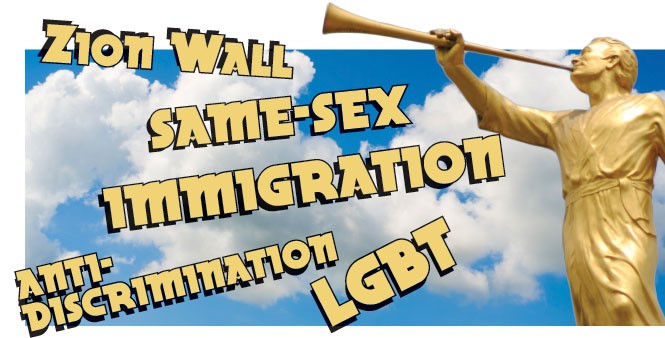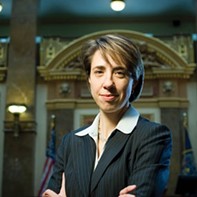Making a Statement
When it comes to modern politics, the LDS Church seems keen on taking a stand
By Eric S. Peterson @ericspetersonAt the beginning of each legislative session, lawmakers and the general public start paying more attention to speeches and press conferences, hoping for insight by leaders in the Legislature and the Governor's Office as to which bills will gain momentum in the upcoming session. In recent years, however, one statement has become highly anticipated:the public-policy statement offered by the top leadership of The Church of Jesus Christ of Latter-day Saints.
On Jan. 27, the second day of this year's legislative session, LDS apostles Dallin Oaks and Jeffrey R. Holland issued a statement of support of some form of nondiscrimination protections in housing and the workplace for LGBT Utahns. But for that support, they wanted to see religious freedom bolstered by the Legislature, ensuring, for example, that a Catholic pharmacist would not be forced into prescribing the "morning after" pill when doing so would go against their beliefs about contraception.
While such statements and posturing push the nonprofit church closer to the edge of political advocacy—a line they're not allowed to cross lest they risk losing their tax-exempt status—the statements, especially the church's support of nondiscrimination legislation has been widely praised by lawmakers and LGBT advocates for helping to clear the air on the controversial topic. The statements also represent the most recent thinking by church leaders, how the church plans to own the message and how members should address critical public-policy issues.
Rep. Stephen Urquhart, R-St. George, called it days before the church's announcement in an interview with City Weekly in which he explained that without guidance from church leaders, LDS lawmakers would undoubtedly shoot down attempts to hear Urquhart's LGBT nondiscrimination bill.
"Most legislators are Mormon, and I think on this they are looking to vote their church values," Urquhart said. "Some think that means they should support the bill; others think that means they should support discrimination."
Salt Lake County Mayor Ben McAdams is both a Mormon and a Democrat. As a former state senator, he maintains that the church, like any other organization, has a First Amendment right to be heard in the public square. In the 2011 session, he says, the church was a welcome voice on controversial issues. "Their input and opinions on sensible and compassionate immigration reform were insightful, and their calls [today] for protections for LGBT Utahns is also welcome input," McAdams says. Like Urquhart, McAdams sees value in knowing the church's position, especially when some lawmakers cite scriptures to support their particular ideology.
"A lot of people will pretend to speak on behalf of the LDS Church without the proper authority," McAdams says. "So, sometimes, it's helpful for [the church] to speak up so we know what they're not saying."
While Mormon leadership has clearlyespoused strong principles since the earliest days of the church's founding, what is relatively new is the aggressive way in which the church has begun to communicate how its principles should be applied when it comes to modern dilemmas like LGBT rights.
In 2014, during the first week of the legislative session, for example, LDS Church Apostle Todd Christofferson released a video statement defending Utah's liquor laws, and the church even released an animated video defending the "Zion Wall," a partition required of many restaurants to shield impressionable eyes from watching the pouring and preparation of alcoholic drinks. Despite the fact that the hospitality industry had asked lawmakers to tear down the "Zion Wall," after the church's animated arguments, the bill soon lost momentum and died.
Matthew Burbank, a professor of political science at the University of Utah, says that while the church obviously wields enormous political power in Utah, it was only recently, during the immigration debate of the past few years, that the church changed the way it got its message out. It used to be through private meetings with leadership on Capitol Hill, but the church now is beginning to rely on explicit statements and direct media interviews.
In 2010, Arizona's Senate Bill 1070 made national headlines for its restrictive approach against undocumented immigrants. It was dubbed the "Show Me Your Papers" bill by critics, since the legislation required immigrants in Arizona to keep registration documents on them at all times. Further, it required law enforcement to check the immigration status of all individuals "reasonably" suspected to be undocumented immigrants.
In Utah, the LDS Church publicly supported alternative approaches including the Utah Compact, a call for compassionate and comprehensive immigration reform promoted by numerous business and civic organizations. Professor Burbank says that, had an Arizona-style package of bills passed in Utah, it would have been damaging to the LDS Church's image and missionary efforts, especially in Latin American countries. The church carefully expressed its support for the Utah Compact based on humanitarian principles while being cautious not to endorse or oppose any bills to avoid the appearance of outright lobbying. Even with the Utah Compact, the church supported the document but did not sign it.
"On the one hand, they don't want to be seen as running Utah politics," Burbank says, "and on the other hand, they are concerned about the way things get done in Utah because, of course, they know that it's going to reflect on them."
Russell Arban Fox, a Mormon scholar and professor of political science at Friends University in Wichita, Kan., says the LDS Church's political stumping has been very sporadic. In the 1930s, the church openly expressed displeasure with President Franklin D. Roosevelt for supporting the repeal of Prohibition, and in the 1970s, the church spoke out against the Equal Rights Amendment. The difference now is as much about public relations as it is politics, given the church's "media-savvy" evolution that began under the late LDS Church President Gordon B. Hinckley and has continued since under President Thomas S. Monson.
Fox says the church's media-savvy evolution has been driven largely by national politics where the church has yet to wield the level of influence it has in the Beehive State.
"It's been a 15- to 20-year process, and a lot of it has kind of been forced by Mitt Romney's run for the presidency," Fox says. "They've just been forced to adapt to figure out what works and what doesn't."
Fox says this new approach has found the church seeking to better control the message about itself, whether that means publishing information about the church's early history of plural marriage and the now-defunct ban on black men holding the priesthood or, more recently, using a local issue (such as nondiscrimination legislation) to address the world on broader issues. Fox says the support for nondiscrimination legislation may also be an attempt to perhaps "apologize" for the church's active support of Proposition 8, the 2008 California ballot amendment that repealed same-sex marriage in the state.
By taking everything good and bad head on, Fox says, the church is learning to control the message. The church's efforts to become an active and recognized political player are almost unprecedented. "It's been maybe a century since there has been such an aggressive attempt by the church to deal with the national stage," Fox says.
More by Eric S. Peterson
-
The Secret Sauce
How Utah lawmakers disclose—or don't disclose—conflicts of interest.
- Feb 14, 2024
-
Police departments in Salt Lake County spent almost $20 million on civil rights complaints in the past decade
The Co$t of Mi$conduct
- Oct 18, 2023
-
Women decry harassment and toxic culture at St. George auto dealership
Men at Work
- Oct 11, 2023
- More »
Latest in News
Readers also liked…
-
Raise a glass for E.L.T Harrison, architect of the Beerhive building on Main
Small Lake City
- Oct 11, 2023






